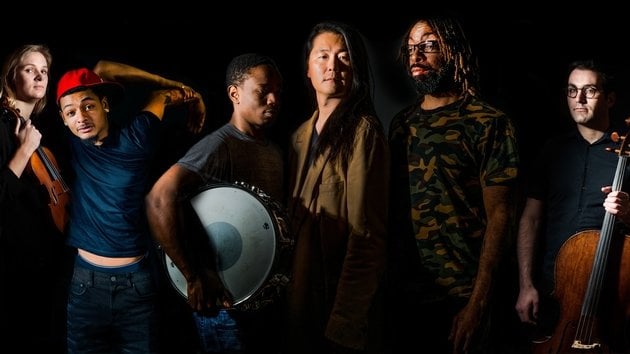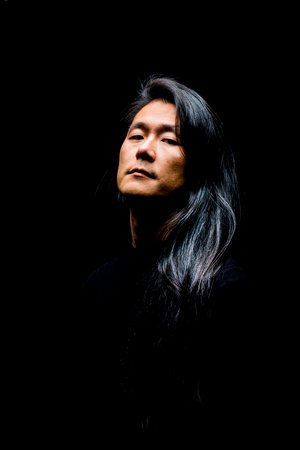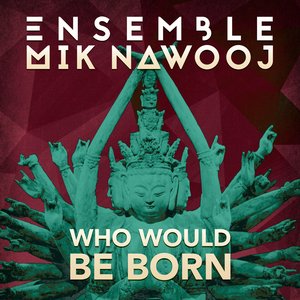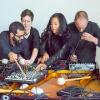
At 20, JooWan Kim left Korea to study composition at Boston’s Berklee College of Music. After graduating from Berklee, he came to the San Francisco Conservatory of Music for his master’s, and he found himself craving something new.
“The world has moved on, and it felt like we needed to invent a new language,” Kim said. “I wanted to shake things up at the conservatory.”
He definitely did that when, for his master’s recital, he composed an orchestral chamber piece, replacing the singer with an emcee and adding a drummer. Professors were skeptical, but the audience loved it, Kim says, and the performance got a full-page write up in the Oakland Tribune.

Kim says at the time, he didn’t particularly love hip-hop and had a hard time keeping up when the rapping was too fast. But he set out to learn about it, listening to classic hip-hop albums and treating it like any piece of modern music. Something changed when he heard N.W.A.’s Straight Outta Compton, and he found the urgency he’d been missing in classical music.
“It was the necessity of the music and the audacity to talk about this stuff,” he said. “I had a sudden conversion experience almost like a religious one. It felt like Dr. Dre put me in the river of hip-hop, and I was free.”
He sent the recording of the recital to Christopher Nicholas, his friend and roommate from Berklee, who says Kim’s music always had a distinct voice and stood out to him. Nicholas felt this pairing of hip-hop and classical music Kim had done was too important for just a one-off.
“I was hearing a cross pollination of cultures, of Black and white coming together,” he said. “In this country, we have a problem with race, and art can be the thing that links people together, and it can break through and in a sense help people.”
In 2010, Nicholas and Kim founded the Ensemble Mik Nawooj, with Nicholas as the executive director and producer and Kim the artistic director and composer. Nicholas believed in what the group was doing so strongly, he put his money where his enthusiasm was, and funded the project for five years, throwing his energy into promoting it. The group has been written up in national outlets including ESPN, The Wall Street Journal, HuffPost, NPR, and Pitchfork, and its latest album, Death Become Life, releasing March 19, was done in partnership with San Francisco’s Asian Art Museum.
Indra Mungal, senior educator for public programs at the museum, got in touch with Mik Nawooj after Saly Lee, the director of the Oakland Asian Cultural Center, invited her to hear the group. Mungal grew up playing classical music on the flute, but hip-hop — and what Kim was doing with it — was a whole new thing for her.
“It blows my mind — these divergent cultural expressions and figuring out how to put them together in a way that doesn’t feel jarring,” she said. “JooWan is so amazingly creative, and he took his classical training and innovated this style. It ignited our imagination.”
Mungal did a program with Mik Nawooj at the museum last May. The ensemble’s album release party was going to be live at the museum, and the ensemble had also done a commission for the 20th anniversary of the Yerba Buena Gardens Festival and planned to perform there as well. The pandemic halted live performances, but the museum backed the creation of an album-length music video, with the galleries featured in the singles, such as “Beethoven on Struggle” and “Who Would Be Born.” The museum and the Yerba Buena Gardens Festival will co-present an online album release party on March 25.

The ensemble works with Turf dancers (an improvisational style that originated in Oakland), and the videos featuring them were filmed in the museum’s galleries.
Kim recalls seeing the dancers perform in front of ancient statues. He feels that what they are doing is similar to what he does, which he describes as “method sampling,” taking snippets and pieces from different styles and genres to create something new.
For the album, Kim deconstructed classic works from Mozart, Bach, and Beethoven. Never unambitious, he paired them with principles from Greek philosophy, including concepts about finding peace in conflict and freedom in confinement. This was a response to the devastation caused by the pandemic, he says. For example, the Beethoven piece sampled is the Coriolan Overture, and Kim says he chose it because the hero of the piece, Coriolanus reminded him how hard it is not to give in to outside pressure.
The music has gotten positive reactions, Nicholas says, as people respond to the ideas of transcendence and struggle.
“A lot of people can’t see their families and businesses have closed,” he said. “This can be a catharsis for people.”
Integrating Greek philosophy into his music is typical of Kim, emcee Edward “Sandman” James thinks.
“I’ve been telling JooWan for the longest time, we have to record this,” he said. “I think this is our best music to date. The music feels like it’s been taken through a narrative and it’s grounded in JooWan’s emotions.”
James says he enjoys working with a group that challenges him as an artist.
“I always thought hip-hop had such range,” he said. “This is hip-hop music made with classical techniques.”
Nicholas says he has seen, through the people who come to the shows and the responses the ensemble gets, how this music can move people. He tells a story about an outdoor show a few years ago in Oakland.
“This older white gentleman came up to Sandman after the first set, and said, ‘I liked your scatting,’” he said. “It touched the guy in a way and intrigued him. He was in his late 70s and still enjoyed it even though this was rap, which for a long time was somewhat demonized, up until six or seven years ago. The culture is shifting.”




